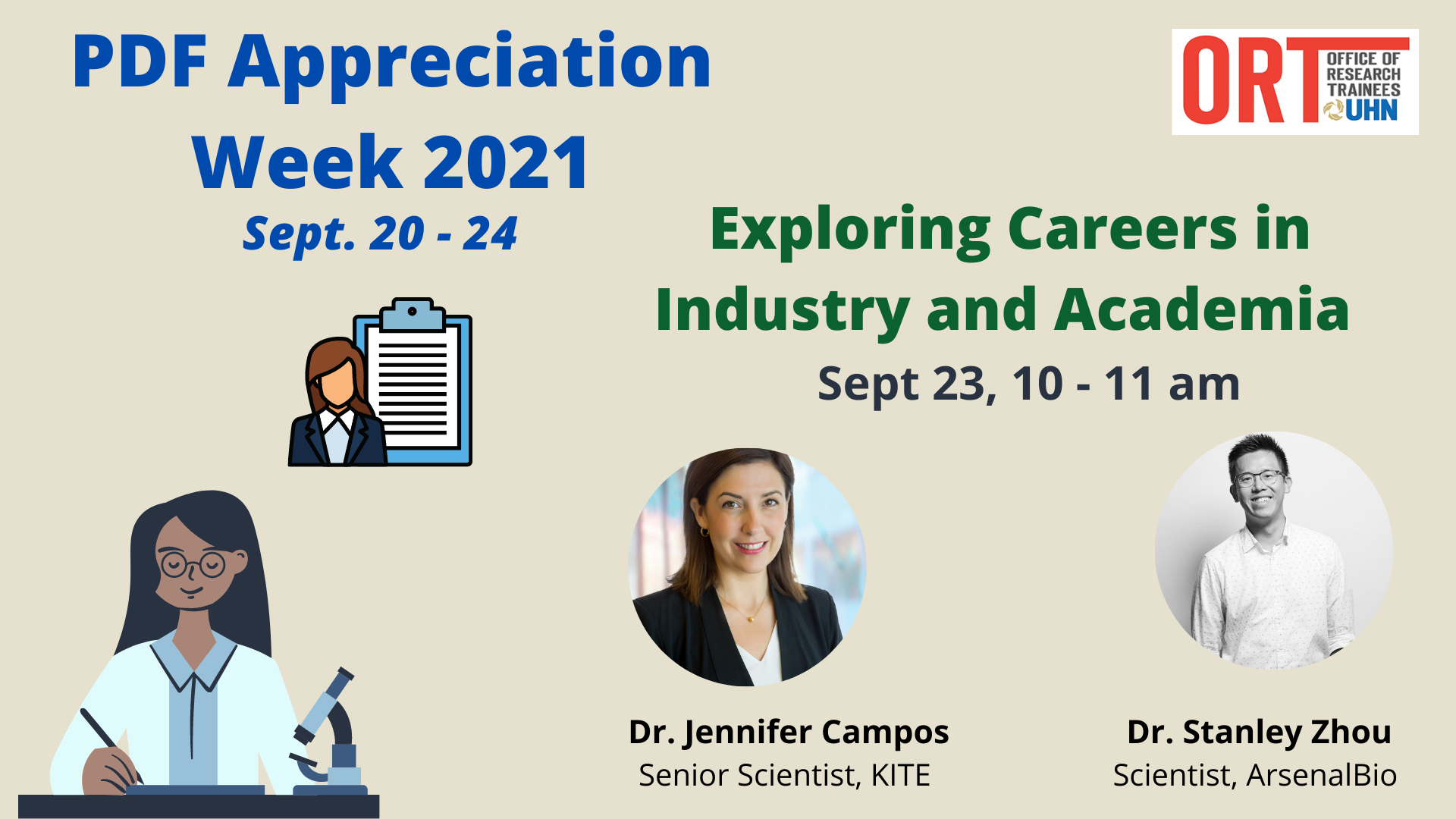
Postdoc Appreciation Week – Exploring Careers in Industry and Academia
The ORT and the UHN Postdoc Association invite you to a PDF Appreciation week event on Exploring Careers in Industry and Academia.
In this special Career Development Event, we are pleased to have Dr. Jennifer Campos to talk about the academic career paths and also tips to become a PI; and Dr. Stanley Zhou to talk about his transition from academia to industry as well as the unique experience with working in biotech (in the US Bay Area). There will also be a Q and A with Drs. Campos and Zhou, allowing postdocs to explore these two popular career options and get your important questions answered!
Register for Postdoc Appreciation Week events here.
Calendar link with Zoom information here: Exploring Careers in Industry and Academia – Postdoc Appreciation Week.
Speaker Bios:
Dr. Jennifer Campos: After completing a PhD in Psychology, Neuroscience, and Behaviour at McMaster University I completed a Post-Doctoral Fellowship and was a Research Team Leader at the Max Planck Institute for Biological Cybernetics (Tübingen, Germany). I joined the Toronto Rehabilitation Institute – University Health Network in 2009 as the inaugural Chief Scientist of the Challenging Environment Assessment Laboratory; a $40 million state-of-the-art virtual reality and simulation facility. I am currently a Canada Research Chair (Tier 2) in Multisensory Integration and Aging, the Associate Director (Academic) and a Senior Scientist at KITE – Toronto Rehabilitation Institute, and an Associate Professor in the Department of Psychology at the University of Toronto. I am the Director of the KITE Young Innovators Youth Outreach Program.
My research focuses on enhancing safe mobility during walking and driving under realistic and challenging conditions. This includes understanding fundamental changes in multisensory integration with age and how age-related sensory declines (e.g. vision, hearing) and cognitive declines can increase the risk of falls and vehicle collisions (e.g. in healthy older adults, individuals with hearing loss, dementia). I make extensive use of virtual reality and simulation technologies.
Dr. Stanley Zhou: I completed my Bachelors of Science at the University of Toronto – St George. Having found success in my undergraduate research at the Krembil Research Institute, I pursued graduate school. I began my PhD in January 2016 under the supervision of Dr. Mathieu Lupien at the Department of Medical Biophysics at the University of Toronto / Princess Margaret Cancer Centre. My Doctoral research centered on understanding how noncoding mutations and epigenetics can impact the development and progression of cancer, with a focus on prostate cancer. During this time, I had the privilege to collaborate with the Canadian Prostate Cancer Genome Network, as well as the Stand Up 2 Cancer West Coast Dream Team. Beyond prostate cancer, I also studied the involvement of epigenetics in breast cancer and leukemia progression.
After completing my PhD, I joined Arsenal Biosciences Inc. a start-up biotechnology company as a Scientist in San Francisco, CA. For the longest time, I was on the academic track – until COVID-19 happened – working from home gave me the time to think about my goals, and why I pursued scientific research in the first place – to do conduct translational research. At Arsenal, we are working on developing best-in-class CAR-T cell therapies for solid tumour patients.

